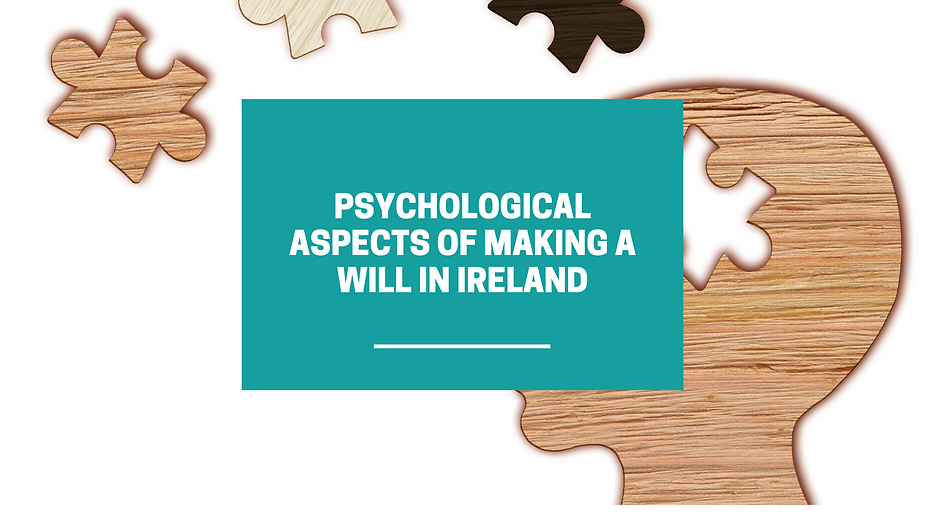Introduction
In Ireland, making a will is not a legal process but also an emotionally significant undertaking. It involves considering one’s mortality, making decisions about assets and loved ones, and facing potential conflicts among family members. Understanding the psychological aspects surrounding the creation of a will is essential to ensure peace of mind, promote familial harmony, and protect the wishes of the testator. This blog delves into various psychological factors involved in making a will in Ireland and offers insights into how individuals can navigate these complexities.
1.Mortality and Facing One’s Own Legacy
Creating a will requires individuals to confront their own mortality. Acknowledging the inevitability of death can evoke strong emotions, such as fear, anxiety, and even existential contemplation. However, embracing this process can also lead to a sense of empowerment and provide an opportunity for individuals to leave a meaningful legacy behind. Recognizing that a will serves as a tangible expression of one’s values, beliefs, and desires can help alleviate the emotional burden associated with contemplating one’s mortality.
2.Decision-Making and Clarity on Intent.
When drafting a will, individuals must make important decisions regarding the distribution of their assets, appointment of guardians for minor children, and even healthcare directives. These decisions can be complex and emotionally challenging. It is crucial to approach the decision-making process with a clear mind, carefully considering the implications of each choice. Seeking legal advice from a professional can provide guidance and clarity, ensuring that one’s intentions are accurately reflected in the will.
3.Family Dynamics and Potential Conflicts
Family dynamics often play a significant role in the creation of a will. In Ireland, where strong family ties are common, potential conflicts can arise when it comes to dividing assets among beneficiaries. The expectation of fair treatment, concerns about favouritism, or differing interpretations of the testator’s intentions can create emotional turmoil and strain family relationships. Open and honest communication with loved ones during the estate planning process can help address these concerns and minimize he likelihood of disputes after one’s passing.
4.Emotional Considerations and Inter-generational Equity
One aspect often overlooked during the will-making process is the emotional impact on beneficiaries. Unequal distribution of assets can create feelings of resentment, jealousy, or hurt among family members. Balancing the desire to treat loved ones fairly with the individual circumstances in needs of each beneficiary is essential. Communicating the reasons behind specific decisions, seeking professional advice, and considering inter-generational equity can help reduce potential emotional distress and promote harmony among family members.
5.Updating and Reviewing the Will
Life is dynamic, and circumstances change overtime. Regularly reviewing and updating a will is essential to reflect any significant life events, such as births, deaths, marriages, or divorces. Failing to update a will can lead to unintended consequences, including disputes and legal challenges. Regularly reviewing and revising one’s will ensure that it remains an accurate reflection of the testator’s wishes, reducing potential emotional and legal complications.
Conclusion
Making a will in Ireland is not just a legal process but also a deeply psychological one. It involves contemplating mortality, making difficult decisions, and navigating complex family dynamics. By understanding and addressing the psychological aspects involves, individuals can ensure peace of mind, protect their wishes, and promote harmony among their loved ones. Seeking professional advice, maintaining open communication, and regularly reviewing the will are essential steps in creating a comprehensive testament hat reflects one’s values and intentions. Through thoughtful consideration, individuals can leave a lasting legacy and provide comfort and clarity to those they leave behind.
If you have any queries on the Will drafting you can contact our Will and probate Department on 01-4854563 or lisa@mckennaandcosolicitors.com

